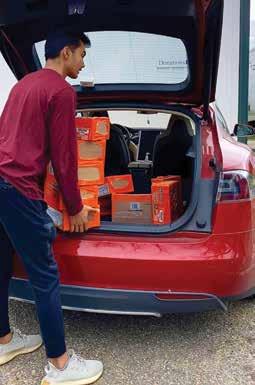Smartwatch App Aids Young Adults with Disabilities Vivian Motti, an assistant professor of information sciences and technology, is pushing smartwatch capabilities beyond fitness tracking and phone calls to help neuro-diverse individuals live more independent lives. Motti and Anna Evmenova, an associate professor of special education and disability research in the College of Education and Human Development, received a grant of more than $700,000 from the U.S. Department of Health and Human Services to develop a smartwatch application that will help young adults with intellectual and developmental disabilities in their daily lives. Young adults with Down syndrome, cerebral palsy, or autism who are enrolled in the Mason LIFE Program (Learning into Future Environments) are usually guided through their days by assistants who help with daily tasks and who intervene when the student gets stressed or overwhelmed. Motti and Evmenova’s app will make those interventions less intrusive for the wearers and the assistants. “The idea is to use the watch to help students with self-regulation,” says Motti. “One of the biggest challenges for assistants is to help the person cope with situations that might be stressful.”
suggestions, such as to take a deep breath, take a walk, or drink water. Typically, these interventions have to be given out loud to figure out what is wrong in any given situation and how to fix it. “In a classroom setting these interventions, while effective, can be stigmatizing because the student has a person beside them that touches them and tells them what to do,” says Motti. “With the watch, the interventions are much less intrusive.” Motti and Evmenova have already created a proof of concept for the watch application. The new grant will allow them to move on to characterizing the scenarios where interventions are necessary and then evaluating those interventions to make sure they are intuitive and easy to use on the watch. Motti is already looking to further possibilities for this project. “In the future, we could automate this process or learn more about how to improve self-regulation, which will be great so that neuro-diverse individuals can become even more independent and included in society.”
The assistant, through a mobile app that is connected to the watch, can ask the student questions about how they are feeling and, based on their response, the assistant can give
32 VOLGENAU SCHOOL OF ENGINEERING ANNUAL REPORT 2020
—Ryley McGinnis






















